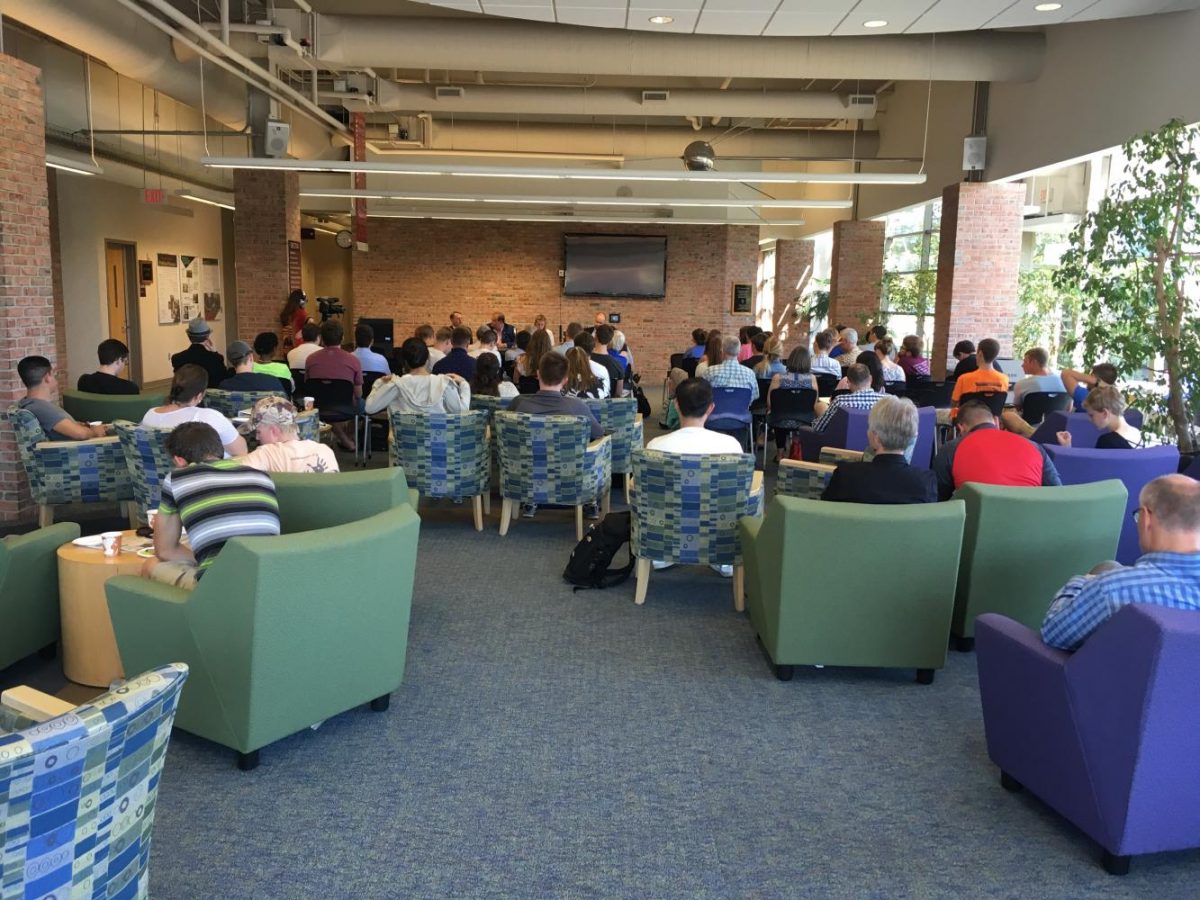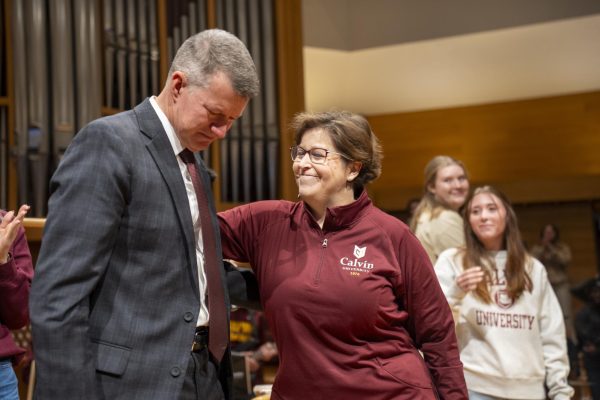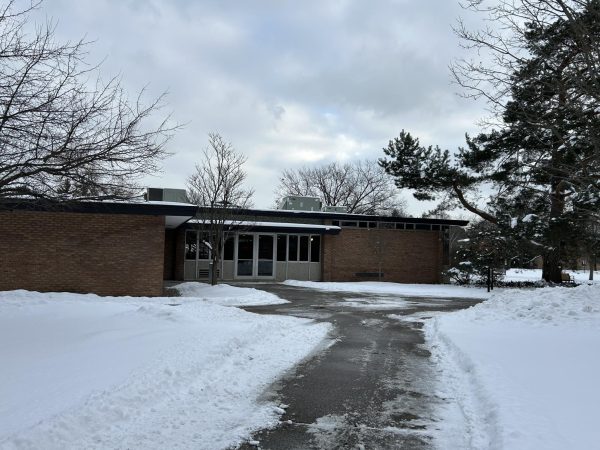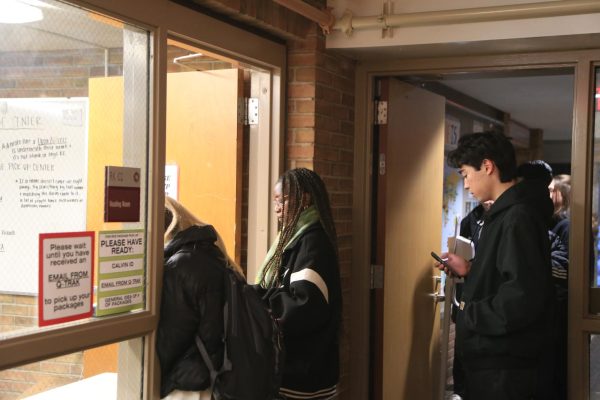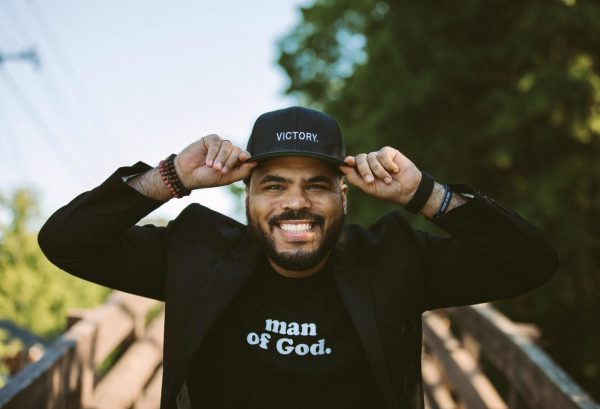Faculty join students in DACA debate
Students, faculty, and community members watch professors and students debate the constitutionality of DACA. Photo by Garrett Serstad.
Two students and two professors debated DACA, focusing on the constitutionality of the president’s authority this past Monday afternoon.
This debate was the first event in the Constitution Series, which is sponsored by both the Calvin College Republicans and the newly-formed Calvin College Democrats, as well as the political science department, the pre-law program, and the Henry Institute.
Around 70 faculty, students and alumni gathered in the lobby of the DeVos Communication Center. Professor Kathi Groenendyk of the communications arts and sciences department moderated.
Junior Renee Maring, secretary of the Calvin College Democrats, represented their position in the debate.
“We were kind of involved in coming up with the exact topic of ‘Is DACA constitutional?’ and then I kind of got roped into debating today.”
The Calvin Democrats invited the Calvin Republicans to the debate, Republican representative Billy Fredericks, who is also president of the Calvin College Republicans, recalled:
Near the end of the summer, Matt Seafield, president of the Calvin College Democrats, asked the Calvin Republicans if they wanted to do something for Constitution Day, which was on Sunday, September 17.
“It’s more important now than ever to encourage civil political discourse between two parties,” added Fredericks. “Because the national level conversation is so negative, we need to set an example as Christians and as students here at Calvin.”
Maring and Fredericks knew which side they would debate before they took the microphone. However, professors Micah Watson and Doug Koopman were randomly assigned at the beginning of the debate. Watson was assigned to argue for the left side and Koopman took the right.
With an analogy to cute pets, Koopman reminded the audience that although we may want to treat certain situations differently, the publicity surrounding an issue does not change its moral status.
Fredericks followed a similar line of reasoning, maintaining that no executive order should be given about an issue Congress has already spoken about. Although he admitted he would have liked to see some sort of immigration reform, he did argue that it should have been passed through Congress instead of as an executive order.
Maring maintained that it was not an overreach for President Obama to use his authority since a bill specifically about immigration reform most likely would not have passed in Congress at that time.
Koopman countered with another analogy, this one about a color-by-number. He said executive orders are intended to help connect the dots that the Constitution and Congress have already designated, not to draw an entirely new picture.
Watson quoted Jesus, saying, “Man was not made for the law, but the law for man.” He reminded the audience of our moral responsibility to the most vulnerable, no matter what the law says. He clarified that DACA did not grant anyone citizenship, it only deferred legal action such as deportation.
Maring agreed with Watson saying that these children who had been covered under DACA did not choose to immigrate; their parents brought them.
Garrett Serstad, a senior political science major, received class credit for watching the debate. He also came because the organizers “really emphasized trying to bring the two parties together. And I think they did a good job on that. … It’s kind of refreshing seeing that they can agree but also disagree.”
Before the debate started, sophomore Cameron Behnam was concerned the Calvin Democrats would focus on morality without considering the legality of DACA, which was the topic of debate. He said he was hoping to see the Calvin Democrats step up to the challenge. “I think they did, and I was very happy about that. … I think it was an overall good debate.”
The organizers considered it a success as well.
“I think we had an excellent turnout,” Fredericks said. “A very significant amount of students showed up, as well as members of the CALL [Calvin Academy for Lifelong Learning] program. … It really showed not only intergenerational unity but it also showed unity between the two parties.”
“I was actually surprised by how many people were here,” added Maring. She had initially thought it would only attract students from within the political science department.
“There were a ton of people and a ton of different ages,” she added.
Fredericks was thankful for the opportunity for civil political engagement.
“We were able to really show what it would look like to have good conversation between the Democrats and Republicans.”
Maring confirmed plans for similar debates in October and November and also expressed hope for more in the spring semester.
“It’s kind of refreshing seeing that they can agree but also disagree”



